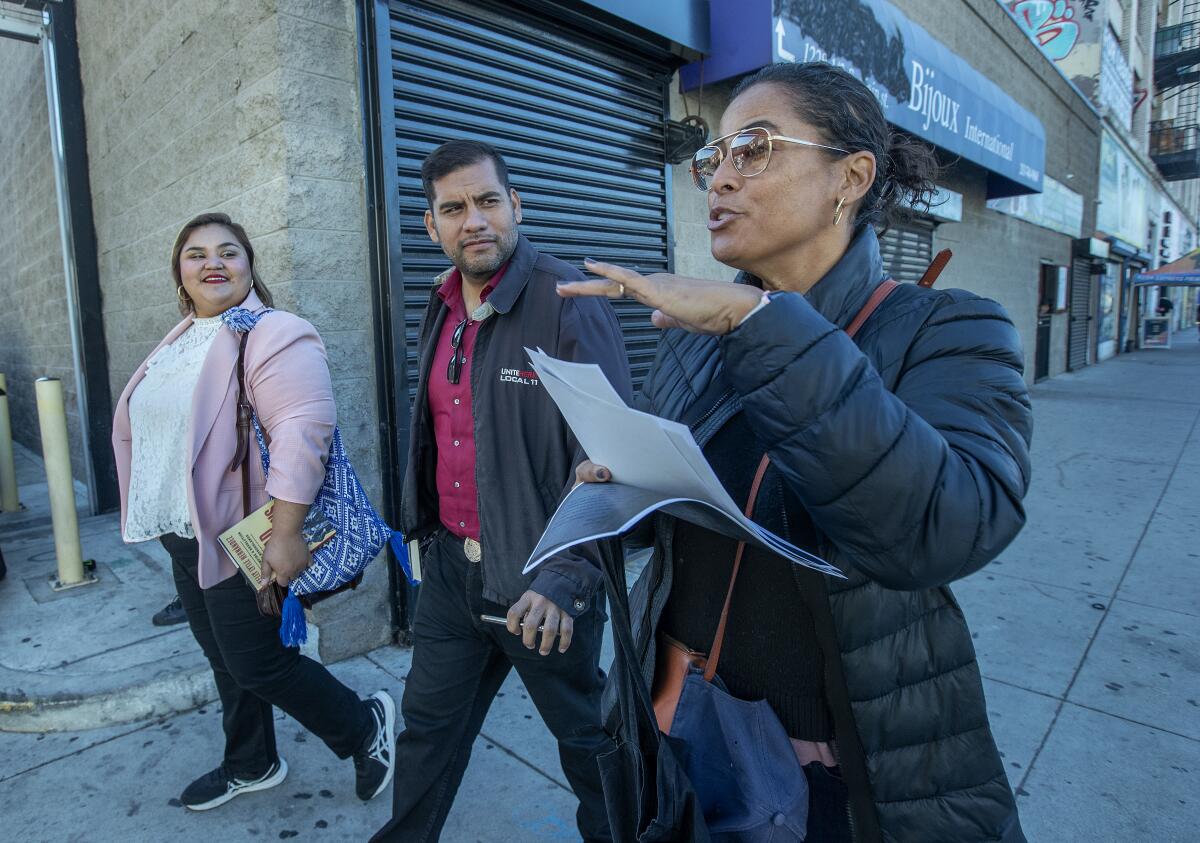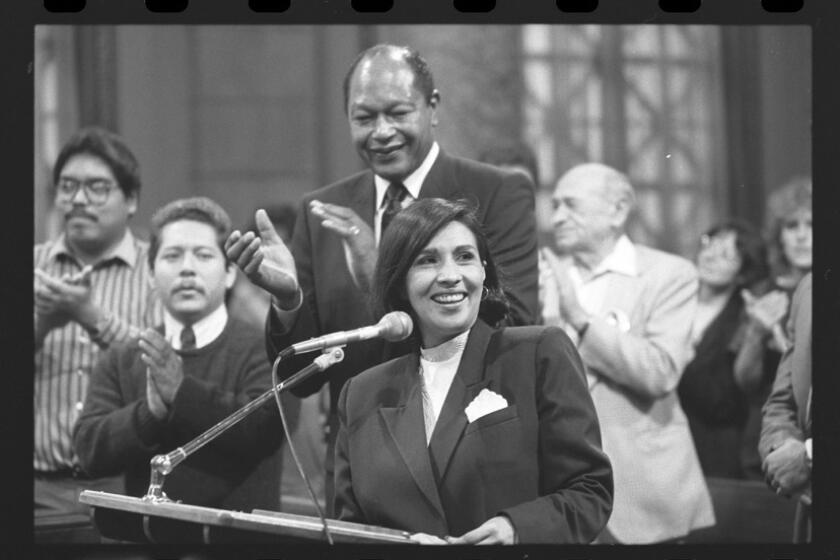Column: In 2024, Latinos finally became Americans at the ballot box

- Share via
Forty years ago in November, Cesar Chavez gave a speech at San Francisco’s Commonwealth Club that was as much of a promise as a warning.
The main topic of the 25-minute talk was the lessons he learned from a career organizing campesinos in California and beyond, in the face of fierce opposition.
“All my life, I have been driven by one dream, one goal, one vision,” Chavez told the hoity-toity crowd. “To overthrow a farm labor system in this nation which treats farmworkers as if they were not important human beings.”
The United Farm Workers leader praised the gains his union was able to achieve. But he felt the big payoff was still ahead for Latinos. They were growing in economic, political and demographic influence — and Chavez felt that memories of past injustices would inform how they wielded power, once they attained it.
A four-part series by Times columnist Gustavo Arellano dives into the history of Latino political power in Los Angeles.
“The day will come when the politicians do the right thing by our people out of political necessity and not out of charity or idealism,” Chavez said, sounding matter-of-fact in a recording of the speech. “That day may not come this year. That day may not come during this decade. But it will come, someday.”
Chavez’s Commonwealth Club address is little known outside academic and activist circles, but I’ve long considered it a masterpiece of prophecy. He mostly called it right: Latinos now make up a plurality of residents in California and are the largest minority group in the country. Researchers at Cal Lutheran and UCLA found earlier this year that if Latinos in the U.S. were their own nation, their $3.7-trillion gross domestic product would rank fifth in the world, behind Germany and ahead of India.
Meanwhile, the number of Latinos in elected office grows every year, from school boards to state legislatures to both chambers of Congress. The political rise was long fueled by a liberal formula pioneered by Chavez’s movimiento: run as a Democrat, align yourself with unions and social justice groups and use the plight of the least among Latinos — farmworkers during Chavez’s era, undocumented immigrants for the past generation — as a moral issue to push Latinos to the ballot box and reject Republican everything.
This winning template spawned fears among conservatives that Latinos — especially Mexican Americans — were engaging in a conspiracy to relegate white people to second-class status, and hopes among Democrats for a permanent majority. It seemed to follow Chavez’s boast that Latinos would create a new, more-just way for this country, one that would manifest Jesus’ teaching that the last would be first and the first would be last.
“And on that day, our nation shall fulfill its creed — and that fulfillment shall enrich us all,” Chavez said in the speech.
But as 2024 concludes, Chavez’s dream of Latino power isn’t playing out the way he forecast.

Donald Trump, who has lambasted Latinos all the way from his 2015 speech announcing his first presidential run to a recent social media post insinuating he would take back the Panama Canal, improved his performance with Latino voters in each of his campaigns.
In Los Angeles County, a Times map of the November election results showed that the biggest drift toward Trump didn’t happen in Republican strongholds but in purple, middle-class Latino cities like Downey and Whittier and blue-collar, Democratic-run, overwhelmingly immigrant communities like Bell Gardens and Maywood.
Surveys showed that Latino voters this year didn’t care about anything other than themselves. Issues like the economy and housing were their top concerns, while securing the border was more important than trying to secure amnesty for people without papers. Indeed, the proportion of Latinos who think illegal immigration is a problem is nearly the same as it was among whites 30 years ago, when California voters overwhelmingly passed the anti-immigrant Proposition 187 while hundreds of thousands of Latinos marched against it.
Kamala Harris still won the Latino vote nationwide, but the Latino-Trump cumbia has drawn headlines, and not just because he outperformed any previous Republican presidential nominee among Latinos. The disbelief and soul-searching among Latino activists and finger-pointing by Democrats will continue throughout 2025, predicated on the idea that Latinos who went with Trump voted against their self-interest. In other words, Latinos didn’t act like Latinos are supposed to, whatever the hell that means.
That’s why I say that 2024 is the year that Latinos finally became Americans.
Seven days. Seven states. Nearly 3,000 miles. Gustavo Arellano talks to Latinos across the Southwest about their hopes, fears and dreams in this election year.
As patronizing and silly as it sounds, there is no precedent for this moment. Even though Spanish was spoken in what’s now the U.S. decades before Jamestown, Americans have long thought of Latinos as a people apart who would poison the proverbial melting pot the more their spice dominated the stew. For more than a century, Latino activists have pursued equal rights with this in mind, casting the people they fought for as a helpless, forever-victimized group that could best find strength through ethnic solidarity.
Instead, Latinos forsook movement politics in this election and seem poised to do the same in the future. We’re now in a political Bizarro World where the GOP thinks Latinos are a winnable group while Dems no longer see us as automatic salvation. Both parties will fight for our votes by de-emphasizing appeals to ethnicity and instead focusing on meat-and-potatoes issues — you know, the way they usually do with “regular” voters.
Latinos are no longer the sleeping giant of American politics. We are the giant. Where we decide to go is where the country will go. We’ve joined the metaphorical firsts — and like previous groups, we’re now spitting on the lasts and want nothing to do with them.
This mainstreaming is something I’ve been calling out throughout the 25 years I’ve covered Latino politics. This year, I saw it play out it in real time.
In the spring, I wrote a four-part series about the history of Latino politics in Los Angeles. In August, I took a seven-day road trip across the American Southwest to gauge the political temperature of Latinos before the Democratic National Convention. I talked to Latino Trump supporters throughout the fall, including many who admitted they once leaned liberal but felt abandoned by Democrats, prompting them to ride shotgun on the Trump Train.
The thread that connected my stories was that change was inevitable, and banking on Latinos to stay in Democratic amber was electoral suicide.

Wokosos and conservatives alike capitalized on dozing Dems who are finally awake to the desmadre before them. On L.A.’s Eastside, the cradle of Latino politics, Democratic Socialist City Council candidates swept away the political machines that dominated elections for decades. On the other end of the political spectrum, Latino Republican legislators now populate Sacramento in such numbers that the California Latino Legislative Caucus is having conversations about dropping its long-standing ban on GOP members.
Latinos are still nowhere near where we need to be in American life to brag about power commensurate with our numbers. There are still too many issues we need to work on, from educational attainment to the cost of living to health and housing disparities.
But the 2024 election showed that many Latinos are open to dropping the left-leaning politics of the past. The party that capitalizes on this opening is the party that can win.
This makes me think again about Chavez’s Commonwealth Club speech. What animated him most was the idea of a California “dominated” by the descendants of farmworkers, who would change things for the better and never forget where they came from, even generations later.
“Once social change begins, it cannot be reversed,” he said. “You cannot uneducate the person who has learned to read. You cannot humiliate the person who feels pride. You cannot oppress the people who are not afraid anymore.”
In 2024, Latinos showed that we are not afraid to think of a post-Latino future, at least at the ballot box. We’re now ready for politicians to treat us as Americans, for better or worse. And wasn’t that the goal all along?
More to Read
Sign up for Essential California
The most important California stories and recommendations in your inbox every morning.
You may occasionally receive promotional content from the Los Angeles Times.













